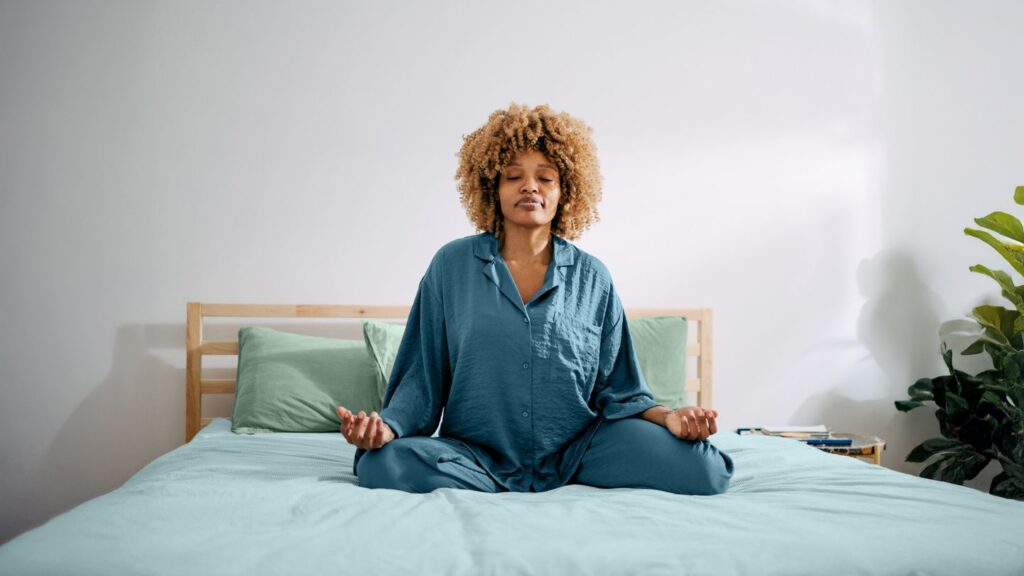A consistent bedtime routine is one of the most important things you can do to ensure high-quality sleep. Whether you have all evening to wind down or just a few minutes, a few simple steps can make it easier to drift off to dreamland so you get a full night’s rest.
“What you do in the few hours before bed sets the stage for how quickly you fall asleep and how restorative your sleep is,” says William Lu, MD, a San Francisco–based sleep medicine physician and the medical director at Dreem Health. “Doing the same things in the same order every night trains your brain to associate those activities with sleep.”
Read on to find out our sleep experts’ favorite tips to prepare for bedtime so you can get a restful night’s slumber.
1. Quiet Your Mind
Sleep experts say it’s important to incorporate regular bedtime activities that help you calm your mind so your brain knows it’s time to rest.
“If your mind is busy, jot down tomorrow’s to-dos or practice a breathing exercise to clear your head,” Dr. Lu suggests. Other ways to tame your thoughts include journaling and meditation.
2. Calm Your Body
“Winding down with calming, predictable activities helps lower both cognitive and physical arousal, which can significantly impact how smoothly you transition into sleep,” explains Michael Gradisar, PhD, a clinical psychologist based in Australia specializing in sleep research and disorders and head of sleep science for the app Sleep Cycle.
3. Darken Your Bedroom
Carleara Weiss, PhD, RN, a research assistant professor at the University of Buffalo who studies sleep disturbances, recommends reducing exposure to bright light at least 30 to 60 minutes before bedtime. Before you hit the hay, she recommends omitting any dim lights from sources such as electronics or street lights. This may mean taping over lights on things like chargers or TVs, turning the clock away from you, and getting room-darkening shades.
4. Keep It Cool
One of the ways our body prepares us for sleep is by reducing our internal temperature. Dr. Gradisar says, “Cooling the body supports the natural drop in temperature that helps trigger sleep.”
Of course, each person’s ideal temperature for sleep will vary based on age, personal preferences, and conditions or medications that affect thermoregulation (such as menopausal hot flashes).
5. Minimize Disturbances
6. Put Electronics Away
Lu says it’s best to turn off screens and silence notifications at least 30 to 60 minutes before bed. This simple change may improve sleep quality and daytime sleepiness.
7. Be Consistent
Consistency is key when it comes to building healthy bedtime habits. “You can classically condition yourself to achieve sleep more easily with consistent rituals leading up to bedtime,” says Lu.
While there isn’t a one-size-fits-all optimal amount of wind-down time, research suggests that between 30 and 90 minutes typically works for most people, Dr. Weiss explains. “Scientists and clinicians with training in behavioral sleep medicine, like myself, usually use 60 minutes as a benchmark and adjust that according to the patient’s routine,” Weiss says.
Even when you’re short on time, take 20 or 30 minutes to create some space between your busy day and sleep, Weiss states. “Using the short time available wisely and intentionally to make this transition will help create a compact, yet effective bedtime routine,” she says, adding that consistency is key to helping your biological clock establish a new rhythm.
If you’re consistent with your relaxing bedtime routine and still wake up feeling unrested, it could be a sign of an underlying sleep disorder like sleep apnea or insomnia, Lu says. That would be worth mentioning to a sleep medicine specialist so you can find a solution for better rest.
The Takeaway
- Create a simple, consistent bedtime routine to significantly improve sleep quality.
- Bedtime routines should ideally begin 30 to 60 minutes before sleep.
- Quiet your mind, darkening your room, keeping the room cool, and minimizing any potential nighttime disturbances can help you fall asleep and stay asleep, according to research and sleep experts.
- If you wake up feeling unrested despite maintaining a consistent nighttime routine, you should consult your healthcare provider or sleep medicine specialist to see if a medical condition or other health issue is interfering with your sleep.

